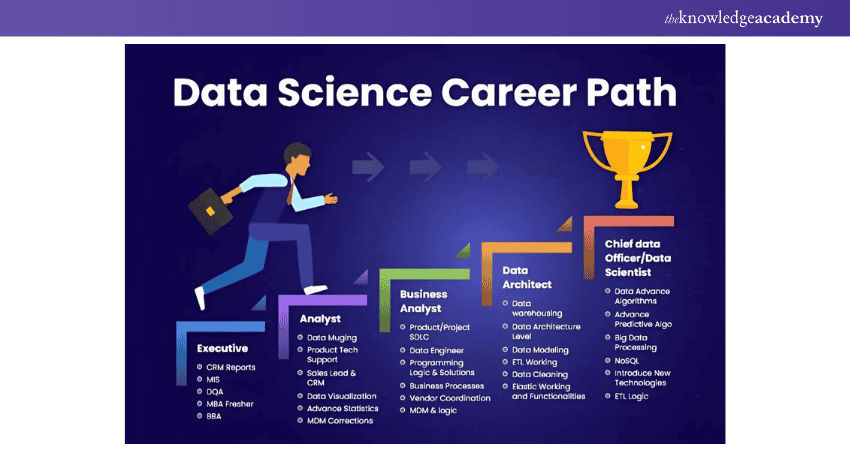We may not have the course you’re looking for. If you enquire or give us a call on +36 18508731 and speak to our training experts, we may still be able to help with your training requirements.
We ensure quality, budget-alignment, and timely delivery by our expert instructors.

The Data Scientist profession has emerged as a crucial role in today's data-centric landscape, combining elements of computer science, statistics, and domain expertise to extract insights from complex datasets. World Economic Forum identified 'Data Analysts and Scientists' among the top 10 jobs expected to grow fastest between 2023 and 2027. The job also comes with a hefty salary and a lot of growth opportunities. 'Data Analysts and Scientists' among the top 10 jobs expected to grow fastest between 2023 and 2027 But Why Choose Data Science as a Career and what makes it so appealing? Read on to find out.
Table of Contents
1) What is Data Science?
2) Who is a Data Scientist?
3) What does a Data Scientist do?
4) The Demand for Data Scientists
5) Salary of Data Scientists
6) How to Become a Data Scientist?
7) Conclusion
The Burning Question: What is Data Science?
With everything going digital, there has been a huge influx of data for companies. Companies can utilise this to their advantage but, first, they need to be able to make sense of it. That’s what Data Science does. Data Science turns all of this senseless data into meaningful insights. These insights help businesses make better decisions.
Data Science uses scientific processes, algorithms, systems, and methods to turn data into insights and further help organisations in decision-making. These insights also help in calculating risks and finding opportunities. With its ability to turn data into actionable intelligence, Data Science has become one of the most sought-after fields in the modern job market, driving demand for professionals, including Data Science Consultants.
Who is a Data Scientist?
Data scientists are professionals who collect, analyse, and process structured and unstructured data. They are skilled professionals who interpret their findings to help businesses make better decisions. More than 2.5 quintillion bytes of data are generated every day. Data Scientists organise, analyse and generate insights from this data. They help in business analysis and even develop prediction algorithms.
Have you ever ordered something and started seeing suggestions for similar products? Data Scientists enable companies to do that! Data Scientists are usually well-versed in computer science, statistics, and mathematics. They apply techniques from Linear Algebra for Data Science to design algorithms that help uncover relationships and patterns in large datasets, such as in recommendation systems.
It can seem like an intimidating field to get into, but it’s equally rewarding and probably even more.
Harness Python for Data Science success with our Python Data Science Course - sign up now!
What Does a Data Scientist do?
Before answering complex business questions, Data scientists also have to determine what questions need to be asked and how to answer them. Developing predictive models is an important part of forecasting results.

Let’s look at some things data scientists do on a daily basis:
a) Identifying trends and patterns in datasets
b) Uncovering insights from datasets
c) Developing algorithms to predict outcomes
d) Developing data models for forecasting
e) Improving data quality and product offerings using machine learning
f) Communicating with the team and others about recommendations
g) Identifying data analytics problems with the best opportunity for growth
h) Collecting structured and unstructured data from various sources
What Are the required Data Scientist skills?
As the demand for skilled Data Scientists increases, companies have fool proofed their skillset requirements for the job. Let’s take a look at some of the required Data Scientist skills:
a) Big Data
b) Data Visualisation
c) Statistics
d) Mathematics
e) Machine Learning
f) Programming
g) Data Wrangling
h) Deep learning
Get ready to ace your data science interview! Prepare with the most common Data Science Interview Questions and impress your interviewer with your knowledge and skills.
Popular Data Scientist Jobs
A Career in Data Science can lead you to various job roles. Here are some of them:
a) Business Intelligence Analyst:
BI Analysts utilize data and help identify market trends. This is done by analysing data and proper business positioning. They help break important business data to help monitor or visualize data.
b) Data Mining Engineer:
Data Mining Engineers examine information from various sources including their own business. They also create algorithms to further analyse data.
c) Data Architect:
Data Architects help develop blueprints for data management systems. They help in centralizing, integrating, maintaining, and protecting data sources.
d) Data Scientist:
Data Scientists help companies understand data and explore patterns to measure how exactly they will impact the business. They help find or develop algorithms for analysing data.

The Impact of Data Science
Data Science has had a huge impact on the world at large. Data Scientists can help automate processes within their organisation, saving a lot of time and money for the company. These resources could be used somewhere else more important. Companies around the world depend on data scientists to help them develop crucial business strategies. Apple, Amazon, and Uber, are some companies that are always looking for skilled data scientists.
Data Science is immensely popular in Big Data and finance. But if that’s not the industry you want to work for, the good news is you can find Data Science in almost every industry, and with the right laptops for Data Science, you can seamlessly contribute to any field you choose. Data Science can help understand human nature and that makes it crucial for industries like entertainment, beauty, cosmetics, etc.
Data Science is even helping fight the adverse effects of climate change. By applying Behavioural Data Science, Data Scientists have been able to build more accurate models for climate and weather prediction, ultimately saving lives. Data Scientists can also help analyse agricultural practices to help farmers increase their output. They can also help in the fight against cancer, prevent blindness, develop medical technologies, and empower the world.
Advance your career in Predictive Analytics- sign up for our Predictive Analytics Course!
The Demand for Data Science
The U.S. Bureau of Labor Statistics (BLS) projects a 36% growth in employment for data scientists from 2023 to 2033. All the huge companies in the world, including MAANG, heavily rely on Data Science for decision-making.
Amazon has been known to analyse customer data to propel its Data Science in Marketing and sales algorithms. Amazon’s data-driven recommendation algorithm is based on customers’ previous purchase history and behaviour. Google uses Data Science to drive its SEO rankings which has a major impact on user experience (UX) online. Apple’s product decisions are largely based on how its devices are used by the customers. Meta uses customer data to show them targeted ads on Facebook and recommend users.
Today, almost every business has adopted a data-driven approach as it has become crucial to their survival. This has created a huge demand for Data Scientists, but the supply is still quite low. Even despite its popularity, it is still an emerging field. That is part of the reason why there are still not enough mainstream college courses that actively include Data Science in the curriculum. Therefore, the majority of the students don’t get to know about the field until much later and this further results in a smaller number of skilled Data Scientists in the market.
While Data Science seems like a comparatively tough field to get into, it is generously rewarding. The field has made a solid mark in the market with no signs of attrition.
Sign up for our Probability and Statistics for Data Science Training today to prepare for a career in Data Science!
Salary of Data Scientists
Data Science is one of the most in-demand jobs with a scarcity of skilled candidates. This means that a job in the field comes with competitive salaries. According to Glassdoor, the average Big Data Engineer Salary for a Data Scientist is £137,436.
The salaries are based on certain factors like your location, the company, etc. To help you get a better idea, we’re listing below the highest-paying countries that are in need of Data Scientists:
|
Country |
Average Annual Salary (GBP) |
|
United States |
£137,436 |
|
Switzerland |
£116,612 |
|
UK |
£99,953 |
|
Australia |
£103,285 |
|
Israel |
£119,300 |
|
Norway |
£99,370 |
|
China |
£81,769 |
|
Canada |
£79,130 |
|
India |
£78,030 |
|
Belgium |
£74,965 |

Another factor to consider here is experience. As you work in the field and gain experience, you can expect to get paid higher. In big companies, you can expect to be paid over £200,000. This is just the base salary that we’re talking about. Bonuses will be added to that number! The final number depends on your overall performance, the company you’re working for, the company’s success, among other things.
While we acknowledge that money isn’t the top reason why you should decide to pursue a career path, it is an important factor. If we consider other influencing factors like job security, job satisfaction, or benefits, Data Science still emerges as a winner. There is enough data to prove that Data Scientists enjoy a reliable income, in a secure job with lots of performance incentives in place.
Future of Data Science
In 2017, The Economist published an article stating that data has become the most valuable asset in the world, leaving oil behind. As the value of data increased, the value of Data Scientists increased as well.
Even though the value of Data Science has increased but most people are still unfamiliar with what the field is really about. This is why even though there are a lot of training programs offered in Data Science; it is still not actively involved in school curriculums. Today’s truth is that companies continue to become increasingly data-driven, and they are utilising Data Science to generate important insights. The influx of data is never-ending, helping the field of Data Science evolve every day.
Working in a field that continues to evolve means that your career will be blessed with opportunities for growth. You can acquire various new skills along the way to help your company make better decisions. Data Science utilises Artificial Intelligence (AI) and Machine Learning (ML) to analyse data more efficiently. With the evolution of Data Science, data will become more and more complex to deal with. Machine Learning can enable companies to let machines deal with the complexities of it. Machine Learning is already helping Google’s search engine algorithm, self-driving cars, etc.
Machine Learning is also an evolving field. Its evolution is going to further grow the scope of Data Science. We can’t accurately predict what the field will look like in the next few years but the one thing that’s for sure is the growth and demand for Data Science.
Build your future with Data Science- Check out our Keras Training for Data Scientists!
Data Science Career Path
Now that we have established how rewarding a career in Data Science is, let’s talk about what the Data Science career path looks like. If you have acquired the required skills in Data Science, you will be on your path to an exciting career, with numerous opportunities, including exploring innovative Data Science Business Ideas.
You can start out working as a Data Science intern and eventually work your way into the field. Once you gain enough experience, you can choose to foray into specialisations like data engineering or machine learning, or you can work your way up to leadership roles. If you choose a specialisation, your career will be focused on that particular field. On the other hand, choosing a leadership role will give you more responsibilities and managerial experience in the company.
Since Data Scientists are actively involved in business decisions, they constantly collaborate with the top management of their company. Should you be inclined toward an executive role, you could go on to become a Chief Data Officer (CDO). If that is your goal, though, you should acquire the necessary management skills as well.
How to Become a Data Scientist?
Data Scientists need to have a solid background in computer science, mathematics, or statistics. With the rise of emerging Data Science Trends, there is a huge demand for Data Scientists in the industry but that doesn’t mean that companies are willing to compromise on the necessary skills they are looking for in a candidate.
Data Scientists usually deal with a heavy and challenging workload and most companies require candidates to hold an advanced degree in the field. Luckily, there are a number of online training programs available that cater to beginners and working professionals looking to improve their skills. You can gain comprehensive knowledge on the subject at your own pace and gain enough experience to be industry ready.
Sign up for our Probability and Statistics for Data Science training today to prepare for a career in Data Science!
Conclusion
Data Science is a rapidly evolving field full of opportunities, with the potential to change the world. It’s one of the top trending technologies globally, and now is the perfect time to get involved.
If you’re intrigued by Data Science and ready to invest time and effort, it could be the right career for you. Understanding the difference between Data Science and Artificial Intelligence can help you make an informed decision about which path to take, based on your interests and skills.
Transform data into decisions with R expertise- kickstart your Data Science with R Training today!
Frequently Asked Questions
What Educational Background is Required for a Career in Data Science?

A career in data science typically requires a Degree in Computer Science, Mathematics, Statistics, or Engineering. Advanced roles may demand a Master's or PhD in Data Science or related fields. In addition, proficiency in programming, machine learning (ML), and data analysis tools can be a valuable asset to your career.
How Do I Stay Updated in the Field of Data Science?

To stay updated in Data Science, you must follow industry blogs, join communities, attend webinars, and take online courses. Moreover, you should also participate in hackathons, explore research papers, and engage with new tools and technologies.
What are the Other Resources and Offers Provided by The Knowledge Academy?

The Knowledge Academy takes global learning to new heights, offering over 3,000 online courses across 490+ locations in 190+ countries. This expansive reach ensures accessibility and convenience for learners worldwide.
Alongside our diverse Online Course Catalogue, encompassing 19 major categories, we go the extra mile by providing a plethora of free educational Online Resources like News updates, Blogs, videos, webinars, and interview questions. Tailoring learning experiences further, professionals can maximise value with customisable Course Bundles of TKA.
What is The Knowledge Pass, and How Does it Work?

The Knowledge Academy’s Knowledge Pass, a prepaid voucher, adds another layer of flexibility, allowing course bookings over a 12-month period. Join us on a journey where education knows no bounds.
What are the Related Courses and Blogs Provided by The Knowledge Academy?

The Knowledge Academy offers various Data Science Courses, including Advanced Data Science Certification, Python Data Science Course, and Data Science with R Training. These courses cater to different skill levels, providing comprehensive insights into How to Become a Big Data Engineer in 2025.
Our Data, Analytics & AI Blogs cover a range of topics related to data science and artificial intelligence, offering valuable resources, best practices, and industry insights. Whether you are a beginner or looking to advance your data analytics skills, The Knowledge Academy's diverse courses and informative blogs have got you covered.
Upcoming Data, Analytics & AI Resources Batches & Dates
Date
 Advanced Data Science Certification
Advanced Data Science Certification
Mon 12th May 2025
Mon 4th Aug 2025
Mon 1st Dec 2025






 Top Rated Course
Top Rated Course




 If you wish to make any changes to your course, please
If you wish to make any changes to your course, please


